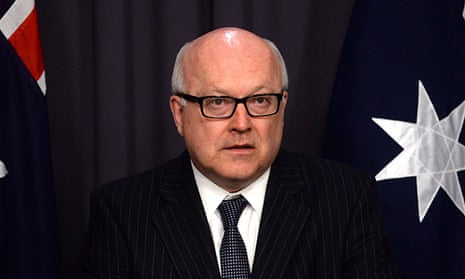Australia’s attorney general has defended new laws criminalising reporting about special intelligence operations, hitting back at criticisms from the “usual suspects of the paranoid fantasist left” but also “reputable conservative commentators”.
George Brandis accused journalists of “belatedly” raising their concerns about press freedom implications, and suggested the offence attracting jail terms of up to 10 years “makes it unlawful to disclose only that which should not be disclosed”.
His intervention on Tuesday followed renewed debate about the government’s first bill to expand the powers of intelligence agencies, including the ability to access computer networks, which passed parliament with bipartisan support late last month.
Senior Labor frontbencher Anthony Albanese spoke out on Sunday, arguing “legitimate criticisms” had been raised about the “draconian” offences affecting the media and they might have to be wound back.
The opposition leader, Bill Shorten, insisted on Monday that Labor had struck the right balance, pointing to a minimal amendment it secured clarifying prosecutorial discretion.
But the board of the World Association of Newspapers and News Publishers added its voice to Australian media groups’ criticism of the laws, describing the legislation as a “threat to the future of journalism” and calling for changes.
The new offence of disclosing information about a special intelligence operation can attract a five-year jail term, raising the prospect that journalists could be prosecuted for reporting about matters that occurred in the past and where there was no longer any risk to lives of officers.
There is a second, aggravated category of the offence with a 10-year jail term where the disclosure would put lives at risk or prejudice the effective conduct of an operation.
Brandis pushed back against the criticisms of the laws in an opinion piece published on Tuesday by the Australian, a News Corp paper.
The attorney general argued the powers of the Australian Security Intelligence Organisation (Asio) needed to be reformed in light of technological advances, and noted the bill passed with the support of both the Coalition and Labor. Its genesis was a report published last year by a bipartisan parliamentary committee.
“Somewhat belatedly, however, after a thorough process of committee hearings, report, and a long parliamentary debate in the Senate, concerns have been raised by some about one particular provision of the bill, Section 35P, on the ground that it constitutes an unreasonable restraint upon freedom of the press,” Brandis wrote.
“That complaint has come not just from the usual suspects of the paranoid fantasist left, but from reputable conservative commentators as well, including this newspaper’s Greg Sheridan. I respectfully disagree with their criticism.”
Brandis said “narrowly defined” special intelligence operations would be used in “relatively rare circumstances”, with authorisation for such activity required from both the attorney general and the director general of Asio.
“By its very nature, it is necessary for [Asio] to undertake covert operations,” he wrote. “Think, for instance, of the covert penetration of a terrorist cell. To make it unlawful to disclose that which, by its very nature, must remain secret, does not seem unreasonable. To suggest otherwise fails the commonsense test.”
Brandis said there had been no prosecutions since the Crimes Act was amended in 2010 to include similar disclosure provisions relating to police “controlled operations”.
He said the first tranche of the government’s security reforms was “not a law about journalists” but rather “a law of general application”.
Brandis specifically dealt with a claim by critics that special intelligence operations should not continue to be protected after they have concluded.
“An operation may be complete, yet leave a residue of interests requiring protection,” he said.
“Disclosure of past operations might well reveal the identity of officers, sources or intelligence-gathering techniques.”
Brandis also dismissed the claim that prohibition of disclosure of information risked concealing unlawful conduct from the public. He said nothing in the new law would prevent a person with information about alleged wrongdoing from telling the inspector general of intelligence and security, an oversight position.
Sheridan, the foreign editor of the Australian, raised his concern about the laws in a column last week, describing the disclosure provisions as “one of the worst moves against media freedom that I have seen”.
Appearing on the ABC’s Q&A program on Monday night, Sheridan pointed out that pre-existing offences already prohibited revealing the identity of an Asio officer. “The government can simply tag everything as a special intelligence operation and stop you writing about it forever more,” he said.
Labor and Coalition panellists on the same Q&A panel defended the laws by focusing on the dangers to agents carrying out operations – which would appear to be a reference to the 10-year aggravated offence that is conditional on lives being put at risk.
The Liberal MP Kelly O’Dwyer, when asked why there was no exemption for journalists, said: “Not everybody’s a responsible journalist.”
The Labor frontbencher Kate Ellis argued the laws that passed parliament with Labor’s support were specific and narrow. “Labor would never support laws which prevent journalists who work reporting national security from being able to do their job,” Ellis said.
Despite Brandis’s comment about the media’s “belated” concerns, Australia’s major news organisations made a joint submission to the parliamentary inquiry in August warning the bill could have a chilling effect on reporting about national security matters.
Within hours of the government presenting the bill to parliament on 16 July, Guardian Australia reported the concerns of lawyers that the “troubling” and “outrageous” disclosure provisions would enable the prosecution and jailing of journalists.





Comments (…)
Sign in or create your Guardian account to join the discussion